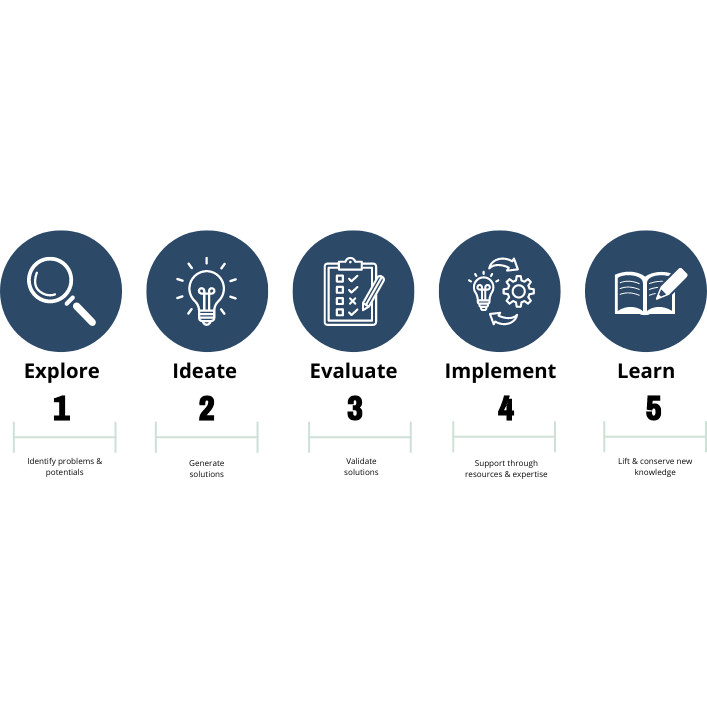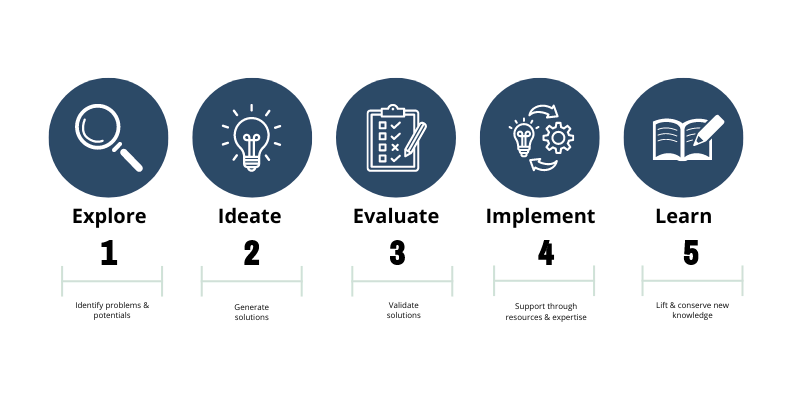In today's era of technological advancement, innovation is critical for businesses. In order to remain competitive in an ever-changing market and drive the business field forward, companies must adapt to the current realities.
Innovation Consulting is an emerging field that helps companies develop innovative technological ideas to realize their growth potential and strengthen their position in national as well as international competition. In this article, we would like to give you an insight into Innovation Consulting and explain your role as an Innovation Consultant. We will explain the importance of this field, explain the consulting process and present proven methods that will help you to accompany companies successfully.
Innovation Consulting: The Turning Point in Management Consulting
1. What Is Innovation Consulting?
Innovation Consulting refers to the process of advising companies on innovation strategies, processes and initiatives. It is a consulting field that helps companies develop innovation processes to create new products, services, business models or technologies. It deals with the promotion and implementation of innovations in organizations in order to achieve competitive advantages and promote growth.
2. What Does an Innovation Consultant Do?
An innovation consultant is an experienced specialist who supports companies in increasing their innovation capability and developing solutions to this end. He or she works closely with the company's employees to create an innovation-friendly environment, enable the exchange of ideas, implement appropriate innovation processes and support the launch of innovative projects. In addition, the Innovation Consultant helps identify technology trends and external partners that may be relevant to the company's innovation efforts. The following diagram illustrates the work of an Innovation Consultant very well:


The responsibilities of an innovation consultant vary by client and project, but may include the following:
- Innovation strategy:
Developing an innovation strategy that takes into account business goals, vision, and direction. This includes identifying innovation opportunities, setting priorities, and defining success criteria. - Idea and Concept Development:
Supporting the generation and development of new ideas, which can be done through workshops, creativity techniques, and engaging various stakeholders. The goal is to develop innovative concepts and solutions that meet customer needs. - Market research and trend analysis:
Conduct market analysis, trend monitoring, and competitive assessment to gain insights into customer needs, market trends, and potential growth opportunities. - Prototyping and Testing:
Assist in the development of prototypes and test models to validate new ideas and obtain early feedback from potential users. This helps to assess the feasibility and added value of innovations and make adjustments. - Implementation and change management:
Supporting the innovation process through to implementation and integration of the developed ideas and concepts into existing corporate structures. This also includes change management to ensure that innovations are accepted and implemented by employees. - Promoting a culture of innovation:
Support in establishing a culture of innovation in the company that promotes openness to new ideas, a willingness to experiment, and the exchange of knowledge and experience.
3. Innovaiton Consulting Process
Analysis phase:
In the analysis phase, as an innovation consultant, you first try to understand the company and define goals. You also assess the company's innovation capability and culture.
Idea development:
Creative techniques such as brainstorming and design thinking help you develop suitable ideas and identify customer and market needs. Prototyping and concept validation are also part of the process.
Strategy development:
Business model development and go-to-market strategies are part of the development strategy. You will carry out projects and calculate resources in this regard.
Implementation of the strategy:
In this step, the strategies are implemented and put into practice.
Evaluation and improvement:
The last step is to measure innovation performance and impact. This involves monitoring the projects you have implemented and adjusting the innovation strategy if necessary. You also identify learning points and success factors.
4. Proven Methods in Innovation Consulting
Design Thinking:
Design thinking is a creative and user-centered approach that aims to solve complex problems and develop innovative solutions. It involves iterative processes such as empathy, definition, idea generation, prototyping, and testing to gain deeper insight into user needs and requirements.
Agile methods:
Agile methods such as Scrum or Kanban are commonly used to drive innovation in small steps and respond quickly to change. These methods encourage an iterative, collaborative, and adaptive approach to developing new products or services.
Open Innovation:
Open Innovation involves working with external partners such as customers, suppliers, universities, or startups to gain new ideas and input for innovation. This approach extends the innovation process beyond the boundaries of the company and enables access to a broader pool of resources and knowledge.
5. Success Factors in Innovation Consulting
As an Innovation Consultant, there are several factors that contribute to the success of your work and also the company:
(a) Leadership and corporate culture:
- Embedding innovation as a strategic priority
- Openness for change and willingness to take risks
- Encouraging creativity and experimentation
b) Interdisciplinary teams:
- Collaboration between different departments and disciplines
- Diversity in experiences and ways of thinking
- Promotion of interdisciplinary learning and exchange
c) Partnerships and networks:
- Cooperation with external experts and organizations
- Access to specialized know-how and resources
- Participation in innovation ecosystems and industry events
6. Challenges in the Innovation Process
Innovation consultants are in high demand. However, they also have to face a few challenges. For one thing, as technology advances, both the technologies themselves and digitization change, as do the associated customer needs and expectations. So as an innovation consultant, you'll also need to bring a certain level of dynamism to your job. In addition, you must always keep an eye on and take into account global competition and market volatility.
7. The Significance of Innovation Consulting
Innovation Consulting offers a variety of benefits for companies.
- Innovation Consulting enables companies to expand their innovation capabilities. The consultant brings fresh perspectives and best practices from other industries that can help generate new ideas and develop innovative approaches. By working closely with the consultant, companies can also better leverage their internal capabilities and resources.
- Innovation Consulting helps companies minimize risk. This is because the consultant provides support in evaluating innovation projects and helps identify potential stumbling blocks and pitfalls. This avoids bad investments and reduces the risk of innovation processes.
- Innovation Consulting enables faster time-to-market for new products and services. The consultant supports the development of effective product strategies, helps overcome market hurdles and promotes an agile approach to product development. This enables companies to respond faster to changing customer needs and achieve competitive advantages.
8. Conclusion
Innovation Consulting plays an increasingly important role in helping companies develop and implement innovative ideas. Through careful analysis, creative idea development, effective implementation and continuous evaluation, companies can increase their innovation capabilities and gain a competitive advantage.
Using proven methodologies such as design thinking, open innovation, technology roadmapping and lean startup, innovation experts can help companies successfully achieve their innovation goals. The future of the innovation consulting industry will be shaped by technological disruption, sustainability, and the need for agility. Companies that master these challenges and adapt to change will achieve long-term success and competitive advantage.
Continue to Learn


